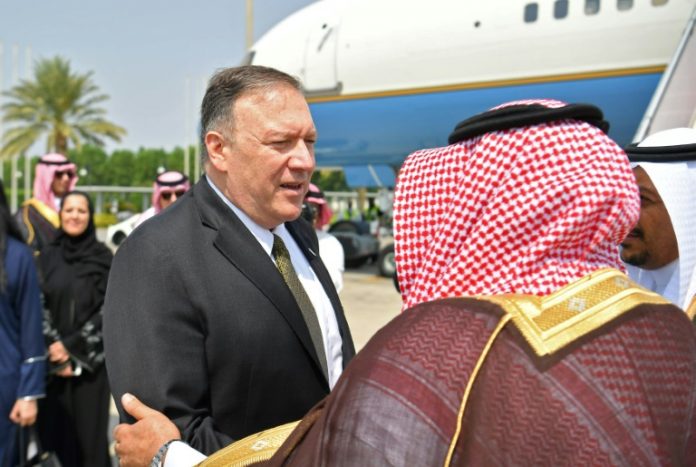US Secretary of State Mike Pompeo headed to the UAE Thursday for further talks with Gulf allies about responding to major attacks on Saudi oil infrastructure which he has denounced as an “act of war” by Iran.
The hardening of the US position raises the risk of a dangerous escalation in the tinderbox region after weekend strikes on the heart of the Saudi oil industry knocked out half its production.
Pompeo flew to Abu Dhabi from the Saudi city of Jeddah, where he met late Wednesday with Crown Prince Mohammed bin Salman, the kingdom’s de facto ruler who has said the assault poses a “real test” of global will.
The two sides “agreed that the Iranian regime must be held accountable for its continued aggressive, reckless, and threatening behaviour,” State Department spokeswoman Morgan Ortagus said in statement after their talks.
The “unacceptable and unprecedented attack… not only threatened Saudi Arabian national security, but also endangered the lives of all the American citizens living and working in Saudi Arabia,” she added.
Pompeo denounced the unprecedented strikes as an Iranian “act of war”, as Riyadh Wednesday unveiled new evidence it said showed the assault was “unquestionably” sponsored by Tehran.
Saudi officials displayed what they said were fragments of 25 drones and cruise missiles fired on Saturday at two facilities in the country’s east, engulfing them in flames.
“The attack was launched from the north and unquestionably sponsored by Iran,” defence ministry spokesman Turki al-Maliki said, but would not be drawn on whether Saudi officials believed Iran would ultimately be found to be the culprit.
Tehran-linked Huthi rebels in the kingdom’s southern neighbour Yemen have claimed responsibility, but both Washington and Riyadh have ruled that out, saying it was beyond their capabilities.
French Foreign Minister Jean-Yves Le Drian also said Thursday that the Huthi claim “lacks credibility”.
The Huthis have hit dozens of targets in Saudi Arabia, and their rapidly advancing arsenal has exposed the vulnerability of the kingdom despite its vast military spending.

Huthi military spokesman Brigadier Yahya Saree said however that the assault on the two facilities was launched from three locations inside Yemen, using advanced drones with long-range capabilities.
He also threatened the United Arab Emirates, a key member of the Saudi-led coalition fighting the Huthis, saying that it was ready to attack dozens of targets including the skyscraper-filled cities of Dubai and Abu Dhabi.
“If you want peace and security for your facilities, and towers made of glass that cannot withstand one drone, then leave Yemen alone,” the rebel spokesman said.
US military planners weighing retaliation have reportedly forwarded a list of Iranian targets including the Abadan oil refinery, one of the world’s largest, or Khark Island, the country’s biggest oil export facility, the New York Times said.
Other potential targets include missile launch sites and other assets of the elite Islamic Revolutionary Guard Corps, and bases in the southwest where unusual activity suggests they had a role in the strikes.

“Any strikes against Iran would almost certainly be carried out by volleys of cruise missiles from Navy vessels. Strike aircraft would be aloft to carry out attacks if Iranian retaliated against the first wave,” the newspaper said.
Cinzia Bianco, a Middle East analyst at the European Council on Foreign Relations, said the incident could possibly “trigger an out-of-control chain of escalatory events.”
“Inside Saudi Arabia there is uncertainty over the most appropriate course of action. However the dominant thinking there points to the US targeting critical infrastructure in Iran as to minimise or exclude any human cost,” she told media.
Late Wednesday CBS News cited an unnamed US official as saying that Iran’s supreme leader Ayatollah Ali Khamenei approved the attack, on condition that it be carried out in a way to deny Iranian involvement.
US officials quoted said the most damning evidence against Iran was unreleased satellite photos showing Iran’s Revolutionary Guard Corps making preparations for the attack at its Ahvaz airbase.
But the commander of Iran’s Revolutionary Guards, Major General Hossein Salami, said Thursday that the country was “so powerful that they are forced to falsely accuse us to be behind any incident”.
Diplomats at the United Nations said experts were expected in the kingdom to lead an international inquiry.
A US official, speaking on condition of anonymity, earlier told media the administration has concluded the attack involved cruise missiles from Iran, and that evidence would be presented at the UN General Assembly next week.
Trump, who has already re-imposed sanctions that have crippled Iran’s economy, promised on Wednesday to “substantially increase” the measures, winning quick praise from Riyadh.
Iran’s Foreign Minister Mohammad Javad Zarif, himself under US sanctions since July 31, described the measures as “illegal” and “inhuman” and designed to hurt ordinary citizens.
















